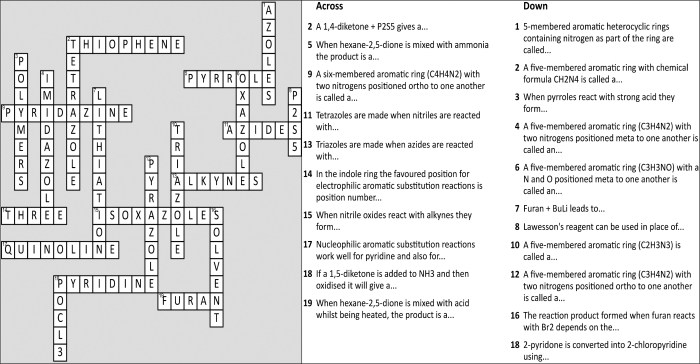Embark on an intellectual odyssey with our thermochemistry crossword puzzle answer key, a treasure trove of knowledge that unveils the intricate workings of chemical reactions. Immerse yourself in the fascinating world of thermochemistry, where heat and chemical transformations intertwine, shaping our understanding of the molecular realm.
Uncover the secrets of endothermic and exothermic reactions, delve into the mysteries of Hess’s law, and master the art of calculating enthalpy changes. Our crossword puzzle provides a playful yet rigorous challenge, testing your comprehension of key concepts and applications.
Thermochemistry: Thermochemistry Crossword Puzzle Answer Key

Thermochemistry is a branch of chemistry that studies the energy changes that occur during chemical reactions. It helps us understand the energetics of chemical reactions, which is crucial for predicting their feasibility and optimizing chemical processes.
Types of Thermochemical Reactions
Thermochemical reactions can be classified into three main types based on the energy change:
- Endothermic reactions: These reactions absorb energy from the surroundings, resulting in a positive change in enthalpy (ΔH > 0).
- Exothermic reactions: These reactions release energy to the surroundings, resulting in a negative change in enthalpy (ΔH< 0).
- Thermoneutral reactions: These reactions have no net energy change, meaning ΔH = 0.
Thermochemical Equations and Calculations
Thermochemical equations represent chemical reactions and include the enthalpy change associated with the reaction. The enthalpy change is denoted by ΔH and is expressed in kilojoules per mole (kJ/mol).
Hess’s law is a useful tool for calculating ΔH for reactions that cannot be measured directly. It states that the overall enthalpy change for a reaction is equal to the sum of the enthalpy changes for the individual steps in the reaction.
Standard enthalpy of formation is the enthalpy change when one mole of a compound is formed from its constituent elements in their standard states. It is used as a reference point for calculating enthalpy changes in reactions.
Applications of Thermochemistry, Thermochemistry crossword puzzle answer key
Thermochemistry has numerous practical applications in various fields, including:
- Industrial processes: Thermochemistry is used to optimize chemical synthesis, fuel combustion, and other industrial processes.
- Environmental science: Thermochemistry helps us understand climate change, pollution, and other environmental issues.
- Biological systems: Thermochemistry plays a vital role in understanding metabolism, enzyme catalysis, and other biological processes.
Experimental Techniques in Thermochemistry
Various experimental techniques are used to measure heat flow and determine ΔH, including:
- Calorimetry: Calorimetry involves measuring the heat released or absorbed during a reaction using devices like bomb calorimeters and solution calorimeters.
- Differential scanning calorimetry (DSC): DSC measures the heat flow difference between a sample and a reference as they are heated or cooled.
- Isothermal titration calorimetry (ITC): ITC measures the heat released or absorbed during a titration reaction.
FAQ Guide
What is the significance of thermochemistry in understanding chemical reactions?
Thermochemistry provides insights into the energy changes that accompany chemical reactions, allowing us to predict their feasibility and optimize reaction conditions.
How can I use Hess’s law to calculate enthalpy changes?
Hess’s law enables the calculation of enthalpy changes for complex reactions by combining the enthalpy changes of simpler reactions.
What are the practical applications of thermochemistry?
Thermochemistry finds applications in diverse fields, including industrial processes, environmental science, and biological systems.
